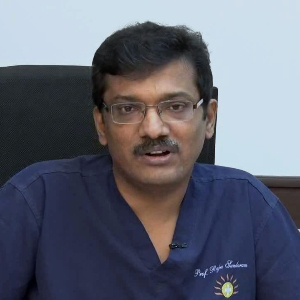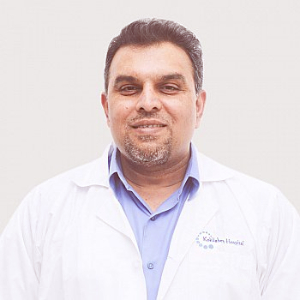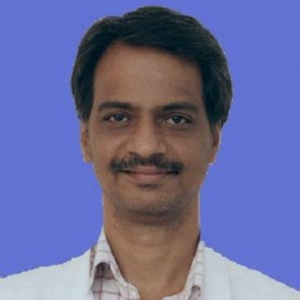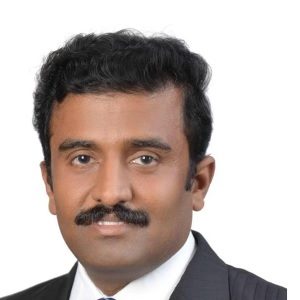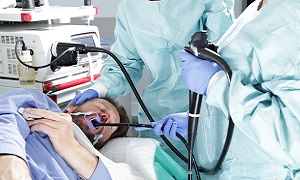Best Doctors in India for Throat Cancer treatment
- Surgical Oncologist, Chennai, India
- Over 25 years’ experience
Profile Highlights:
- Dr. Rajasundaram is a highly successful and experienced Surgical Oncologist with great expertise in performing laparoscopic cancer surgeries.
- He has over 25 years of experience in Surgical Oncology and has performed more than 15,000 cancer-related surgeries till date.
- His expertise lies in the treatment of various types of cancers including organ cancers, solid cancers, blood cancers, inherited cancers, and benign tumors.
- ENT, Head & Neck Onco Surgeon; Mumbai, India
- Over 30 years’ experience
Profile Highlights:
- Dr. Sanjiv Badhwar is a well-known Head and Neck Onco surgeon in Mumbai.
- He specializes in head and neck surgery for cancer patients, cochlear implant surgery, robotic surgery to remove cancer of the head and neck region, voice disorder surgery, and other types of ENT surgeries.
- He holds an experience of over 30 years as an ENT specialist and has received advanced training from the Voice Institute in Portland, USA
- Surgical Oncologist, Hyderabad, India
- Over 20 years’ experience
Profile Highlights:
- Dr. Sharan Kumar Shetty is a renowned Head and Neck Surgical Oncologist in Hyderabad currently associated with CARE Hospitals.
- He has experience of over 20 years in the field and is an expert in the treatment of cancers affecting the head and neck regions such as the oral cavity, larynx, pharynx, trachea, sinus, salivary gland, nose, and throat.
- Dr. Sharan Kumar Shetty’s expertise also lies in reconstructive cancer surgeries using free flap and pedicled flaps.
- Surgical Oncologist, Gurugram, India
- Over 10 years’ experience
Profile Highlights:
- Dr. Shilpi Sharma is a highly experienced surgeon and oncologist who has previously worked in prestigious institutions such as Tata Memorial Hospital, and National Cancer Institute.
- Throughout her career, she has conducted various high-quality research in the field of head and neck cancers. Dr. Shilpi Sharma has also been part of various randomized and nonrandomized trials and has also been involved in clinical and translational research.
- She is also a member of ICMR guideline committee which formulated the ICMR guidelines on tongue cancers.
- Surgical Oncologist, Head & Neck Surgical Oncologist; Chennai, India
- Over 18 years’ experience
Profile Highlights:
- Dr. Kannan S is a prominent Otorhinolaryngologist in India with nearly 18 years of experience.
- He holds a position as a Consultant Head and Neck Oncosurgeon in Apollo Cancer Institutes, Chennai.
- Being an MS and MBBS in Surgical Oncology, his interests led him to treat many ENT problems.
- He published several papers related to the same. He regularly attends conferences in his field and has also been awarded for his work.
Best Hospitals in India for Throat Cancer treatment
CK Birla Hospital, Gurugram
- City: Gurugram, India
Hospital Highlights:
- The CK Birla Hospital in Gurugram is a NABH-accredited multi-specialty hospital.
- The hospital strives to increase the quality of healthcare by focusing on UK NHS nurse and midwife training requirements. Policies and practices derived from the National Institute for Health and Treatment Excellence (NICE) recommendations in the United Kingdom ensuring that a strong focus on safety, high-quality clinical care, and sanitation is maintained.
- The hospital’s cutting-edge technology and facilities allow for real-time communication and seamless collaboration among caregivers, ensuring accuracy and the best possible results. Those with foreign experience and accreditations make up part of the hospital’s team of clinicians.
KIMS Hospital, Hyderabad
- City: Hyderabad, India
Hospital Highlights:
- KIMS Hospital (a brand name of Krishna Institute of Medical Sciences) is one of the largest and best multi-speciality hospitals in Hyderabad. The hospital provides various treatments to an enormous number of patients.
- The hospital has a capacity of more than 3000 beds. KIMS Hospitals offers different healthcare services in more than 25 specialities and super specialities.
- The hospital is equipped with modern medical equipment and technology. It has robotic equipment to provide minimal invasive techniques for patients.
- The hospital is aimed at providing world-class healthcare facilities and services at an affordable cost for patients.
- The various specialities and departments of the hospital include neurosciences, gastroenterology & hepatology, robotic science, reproductive sciences, dental science, oncological sciences, organ transplantation, heart and lung transplantation and mother and child care.
Fortis Hospital, Shalimar Bagh
- City: New Delhi, India
Hospital Highlights:
- Fortis Hospital in Shalimar Bagh is a multi-super specialty hospital that strives to provide world-class patient care by leaving no stone unturned.
- Fortis, Shalimar Bagh, with 262 beds and a 7.34-acre footprint, provides the best level of medical care through its team of doctors, nurses, technicians, and management professionals.
Reliance Hospital, Mumbai
- City: Mumbai, India
Hospital Highlights:
- Reliance Hospital is one of the best super-specialty care hospitals in Navi Mumbai.
- The main purpose of this hospital is to become a trustworthy place for the best health and hope for society. The hospital is well connected to the suburbs of Mumbai and Navi Mumbai.
- The hospital has various specialty departments, viz., Accident & Emergency, Anesthesiology, Dental Services, Dermatology, Diabetology, Dietetics Nutrition, Endocrinology, ENT, Gastroenterology, General Surgery, Gynaecology And Obstetrics, Hepato Pancreato Biliary Surgery, Infectious Disease, Internal Medicine, Interventional Radiology, Laboratory Medicine, Minimal Access Laparoscopic Surgery, Nephrology, Neurosciences, Opthalmology, Orthopaedics, Paediatrics, Pain Management Palliative Care, Physical Medicine Rehabilitation, Plastic And Reconstructive Surgery, Psychiatry, Pulmonary Medicine, Radiology, Rheumatology, Transplant, Urology Andrology, Vascular Surgery
Lilavati Hospital & Research Centre, Mumbai
- City: Mumbai, India
Hospital Highlights:
- Lilavati Hospital & Research Centre is India’s premier multi-speciality tertiary care hospital and has been recognised as a global medical excellence centre.
- Lilavati Hospital & Research Centre has built an unrivalled level of trust with its patients over the years, thanks to a solid foundation that comprises cutting-edge facilities, the best medical competence, research, education, and charity endeavours.
- The hospital is quite proud of the fact that it now serves patients from all kinds of backgrounds, not just from the United States but from all around the world.
- The hospital has a total of 323 beds, one of the largest Intensive Care Units (ICUs), 12 Operation Theatres with modern amenities, over 300 consultants, and almost 1,800 personnel.
MGM Healthcare, Chennai
- City: Chennai, India
Hospital Highlights:
- Located in Chennai, India, MGM Healthcare is a top multispecialty hospital that provides all medical services under one roof.
- Since its founding in 2019, MGM Healthcare has quickly become a leading national referral centre, creating several innovative flagship initiatives.
- MGM Healthcare combines next-generation medical and digital technologies to provide better patient results.
- With 12 centres of excellence, more than 400 inpatient beds, 100 intensive care unit beds, and 24/7 emergency care, MGM Healthcare leaves no chance in redefining the patient experience in Chennai.
- MGM Healthcare boasts 250+ expert doctors across 30+ departments, including Cardiology, Pulmonology, Neurology, Obstetrics & Gynaecology, and more.
- They house 12 specialized Centres of Excellence, including Neurosciences, Orthopaedics, and Multi-Organ Transplantation.
- Their team of doctors, nurses, and paramedics works together to give every patient individualized treatment.
Throat Cancer
Throat cancer is the presence of cancerous tumors that develop in the throat (pharynx), tonsils or the voice box (larynx). Beginning behind the nose, throat is a muscular tube that ends in your neck. This type of cancer usually begins in the flat cells lining the inside of the throat. The voice box is present below the throat and is at an equal risk of throat cancer. Cartilage makes up the voice box. Vocal cords that vibrate making sound whenever you talk are present in the voice box. Epiglottis acts as a lid for the windpipe. Throat cancer can also affect a part of the epiglottis.
Types of Throat Cancer
Cancer that develops in the voice box or throat is throat cancer. The voice box, present below the throat is very close to it. Most throat cancers occur involving the same type of cells.
- Nasopharyngeal cancer –It begins in the nasopharynx. The nasopharynx is that part of your throat present immediately behind the nose.
- Oropharyngeal cancer – It begins in the oropharynx. The oropharynx is the part of your throat present behind the mouth and including the tonsils.
- Laryngopharyngeal or hypopharyngeal cancer – It begins in the hypopharynx or laryngopharynx. This is the lower part of your throat above the windpipe and the esophagus.
- Glottic cancer – It begins in the vocal cords.
- Supraglottic cancer – This cancer begins in the upper part of the larynx including cancer that affects epiglottis. Epiglottis is a piece of cartilage that prevents the food from entering the windpipe.
- Subglottic cancer – It begins in the lower part of the voice box below the vocal cords.
Causes of Throat Cancer
When the cells in your throat develop genetic mutations, throat cancer develops. These genetic mutations cause uncontrollable growth of the cells that continue to live till the time normal cells would die. These cells form a tumor in the throat. Doctors are still trying to find out the cause behind these genetic mutations that cause throat cancer. However, doctors had a successful hand in figuring out the factors that pose an increased risk.
Symptoms of Throat Cancer
The various signs and symptoms of this type of cancer may be:
- Severe cough
- Difficulty in swallowing the food
- A never healing lump or sore present in the throat
- Unexpected weight loss
- Pain in the ears
- Changes in the voice like the hoarseness of the voice or unable to speak clearly
- A sore throat
Diagnosis of Throat Cancer
Your doctor may recommend various ways to diagnose the presence of throat cancer in your body.
Endoscopy
Your doctor may use an endoscope (a lighted scope) to have a close look at your throat while performing the procedure called endoscopy. There is a tiny camera present at the end of the endoscope. The camera transmits the images to a video screen. Your doctor will watch this screen to check for the signs of abnormalities in your throat.
Use of laryngoscope
There is another type of scope called laryngoscope that your doctor will insert in your voice box. The laryngoscope makes use of a magnifying lens to help the doctor for examining your vocal cords. The procedure is laryngoscopy.
Removal of the tissue sample
If your doctor finds some abnormalities during the procedure of laryngoscopy or endoscopy, he or she will pass surgical instruments through the scope for the collection of a tissue sample. This tissue sample is for the purpose of biopsy. Your doctor will send the sample to the laboratory for the testing. Your doctor might also ask for a sample of a swollen lymph node. He or she may use a technique called fine needle aspirate to aspirate the fluid from your swollen lymph nodes for the testing of the sample.
Imaging tests
Imaging tests include the X-rays, computed tomography (CT) scan, magnetic resonance imaging (MRI) and positron emission tomography (PET). These imaging tests may help your doctor in determining the extent of cancer in your body and whether it is beyond the surface of the voice box or your throat. Your doctor can confirm the diagnosis with the help of these imaging tests after carrying out a biopsy of the tissue.
Treatment options for Throat Cancer
Your treatment options may depend on various factors like the location, the staging of throat cancer in your body, your overall health, the types of cells involved in cancer and your personal preferences for the treatment. You must discuss in detail about the benefits as well as the possible health risks of each of the treatment options given by your doctor. This way you can easily determine the most appropriate treatment for yourself with the help of your doctor.
Radiation therapy
Radiation therapy requires the usage of high energy beams from sources like X-rays and the protons to deliver radiation to the cancerous cells in your throat that result in the death of these cells. It can either come out from a large machine outside your body called external beam radiation or cone out from the small radioactive seeds and wires that the doctor will place inside your body near to the location of cancer. The procedure is brachytherapy.
For early throat cancers, radiation therapy is the only possible and necessary treatment. For more advanced throat cancers, radiation therapy combined with surgery or chemotherapy gives desirable results. In most advanced throat cancers, this therapy reduces the signs & symptoms to make you feel more comfortable.
Surgery
Early-stage throat cancer surgery
When throat cancer remains confined to the surface of your throat or the vocal cords, the doctor might treat it surgically with the help of endoscopy. Your doctor will insert a hollow endoscope in your voice box or throat followed by the passing of special surgical tools or laser through this scope. Your doctor can cut off, scrape off or even vaporize superficial cancers (in case of laser) with the help of these tools.
Laryngectomy
Your doctor may remove a part of your voice box affected with cancer for smaller tumors. He or she will try to leave as much voice box as possible. The motive behind this is to preserve your ability to breathe and speak in a normal manner. For extensive & large tumors, there might be a need to remove the entire voice box.
Pharyngectomy
Your doctor may remove only smaller parts of your throat during the surgery of the smaller throat cancers. However, reconstruction of the removed parts is possible to allow you to swallow the food normally.
Neck dissection
Your doctor will recommend you to undergo surgery for the removal of some or all of the lymph nodes. This is because the cancer is present deep within your neck.
Chemotherapy


